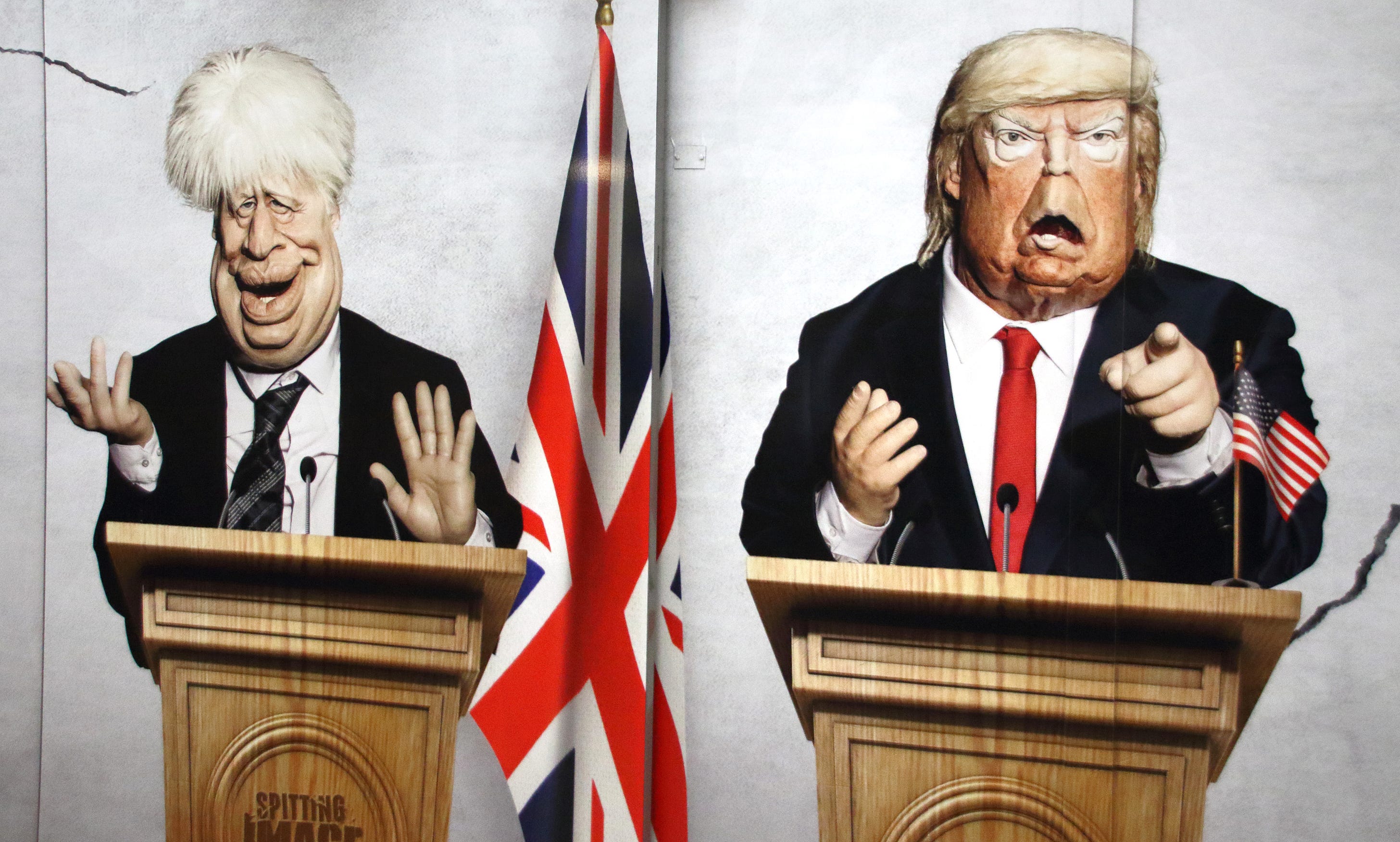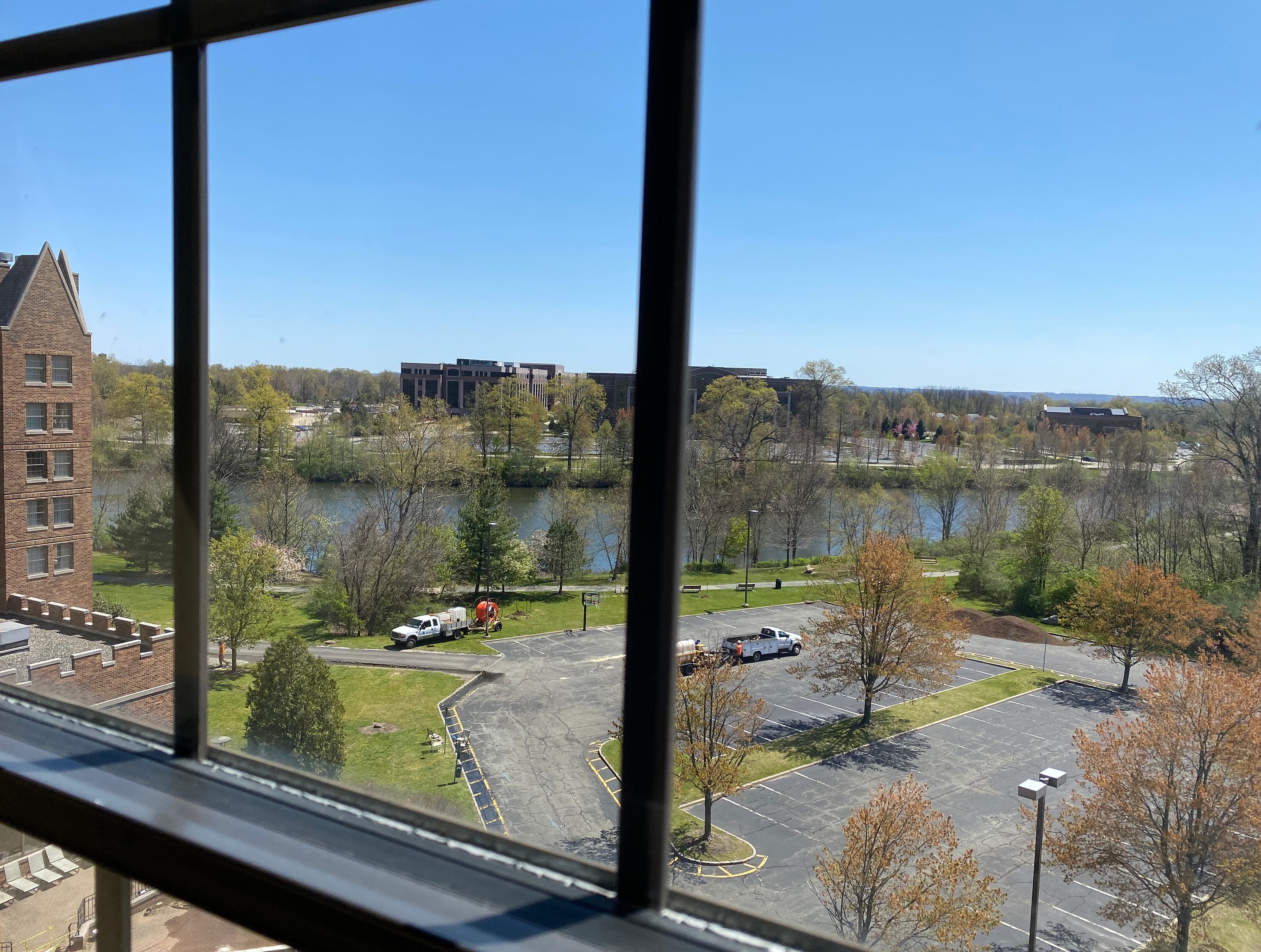Ditching The DisruptersCan the GOP follow the Tories and leave their toxic but transformative leader behind?
The exit has, indeed, had its moments. Andrew Neil succinctly recounted the preceding rat-a-tat-tat of petty sleaze from Boris — “about who was paying for gold wallpaper in his Downing Street apartment or a planned $180,000 tree house in his official country residence” — and the more egregious flimflam as he imposed a brutal lockdown on the entire country, forcing even the Queen to mourn her husband alone and isolated, while turning Number 10 into a scene from Animal House (as he had done at the offices of The Spectator years before):
And on and on. The actual law-breaking and lies about law-breaking were cast in even worse light by the news today that the opposition leader, Keir Starmer, has been cleared by the police from the charge that he too had violated the lockdown rules. Starmer, to heighten the contrast, had publicly stated that he’d resign his position if he were found guilty. The difference between Keir and Boris (and I’ve known both for decades) is pretty obvious: Keir is a somewhat dull, decent bloke and Boris is an entitled, colorful charlatan. But the glee of the elites and the mainstream media at this likable rogue’s political demise obscures something important. They were wrong to conflate him with Trump. Boris is a liar the way Bill Clinton was a liar: he lied to get himself out of trouble he’d gotten himself into. And, like Clinton, Boris had some relationship to reality — even as he tried to bluff and bluster his way through it. Trump’s lies were far, far graver and bolder: that he’d won an election in a landslide (when he lost), and that our entire electoral system is rigged. And Trump, unlike Boris, is truly pathological and psychologically broken — incapable of distinguishing his own egomaniac fantasies from the real world. But Boris and Trump did share one critical characteristic: they had better political instincts in the mid-2010s than almost all their peers. They identified issues — mass immigration, warp-speed globalization, the plight of the left-behind — that actually mattered to ordinary voters but were often invisible to metropolitan meritocrats, like me. They disrupted a corrupt elite consensus. And, when viewed with some perspective, that disruption was necessary, if not sufficient. In the mid 2010s, something snapped in the psyche of a critical mass of voters in the US and the UK. They felt abandoned by politicians, condescended to by liberal elites, ignored in the wave of economic globalization, taken for granted by the two parties. Struggling to get by, they also felt less and less at home in their own country. For this, they were derided as racists and bigots or deplorables, or simply ignored. The pressure had been building for some time — and it finally broke in June of 2016, when the British public shocked the world and themselves by voting narrowly to leave the EU, and later that year, when many Americans simply couldn’t face a future with Hillary Clinton and the status quo and threw their support to Donald Trump. In Britain, the elite — stunned and scandalized by this populist uprising — subsequently tried to prevent any meaningful exit from the EU. Prime Minister Theresa May — who had voted to remain in the EU — did all she could to square the circle in parliament, but failed miserably. In a deadlock between the slim majority of pro-leave Brits and an overwhelmingly pro-EU elite determined to foil them, Boris Johnson emerged as the disrupter who got it done. For the core legitimacy of the British state, this role was invaluable. Imagine if the elites had thwarted Brexit. Imagine the populist backlash, democratic crisis and surge of rightwing extremism if the referendum result had simply been vetoed by the elite. This is what too many miss: Boris did not represent a far-right, racist takeover. He actually prevented one. He was rewarded with the biggest parliamentary majority in decades, and, with some real courage and bullshit, took Britain out of the EU. In the process, he and his top adviser, Dominic Cummings, transformed British conservatism into a more populist, patriotic, working-class party, claiming old Labour strongholds in the north while keeping the Tory shires in the south. They also kept the radical left Labour leader, Jeremy Corbyn, from Downing Street, helping to usher in the more electable opposition we have today. But character matters. And Boris’ preternatural laziness, Micawberesque confidence, and priapic passions soon showed up. As his primary political guide, he picked his girlfriend, Carrie, over Cummings. He veered all over the place on policy. He first opposed a Covid lockdown, then reversed himself. On immigration, leaving the EU did indeed halt mass (largely European) migration from the continent. But his immigration reform also increased immigration from outside Europe — largely non-white and highly educated. Eric Kaufmann notes:
Boris also offered visas to the citizens of Hong Kong. This is not exactly what most Brexit supporters thought they were voting for. Neither was the Tory base exactly excited by the prime minister’s dogged pursuit of net-zero carbon emissions. But he did walk the walk on this — which has made Britain’s energy crisis temporarily worse in the wake of the Ukraine war. Even the lefty Guardian had to acknowledge today that Boris “oversaw the Cop26 UN climate summit in Glasgow; three vital pieces of environmental legislation in the environment bill, agriculture bill and fisheries bill; and the net zero strategy.” He put taxes up; he recently proposed lowering them. His instincts were woke, until they weren’t — belatedly withdrawing his promise to ban trans “conversion therapy.” If you want to read a conventional old-school conservative critique of his policies, here’s the WSJ editorial board, and here’s Melanie Phillips. The shift toward a more one-nation, redistributionist Toryism remains an unbaked cake. But what finished Boris wasn’t policy incoherence or lack of discipline. He had, after all, just won a stonking majority only two and a half years before. His downfall was caused by the absolute absence of any trustworthiness. When I went over to the UK a few years ago to do a profile of him, almost every source I spoke to — pro- and anti-Johnson, old and new friends, Leavers and Remainers, colleagues and fellow hacks — said he’d shamelessly lied to them to their face. “For someone so prodigiously talented to have no moral core is heartbreaking,” an old chum told me. His lies were often petty and unnecessary, which made them more infuriating. At Eton, one teacher summed up Boris: “I think he honestly believes that it is churlish of us not to regard him as an exception, one who should be free of the network of obligation which binds everyone else.” Covid proved it. To be partying while everyone else was obeying draconian social distancing laws he himself passed is an issue anyone can understand. In any other time, his boozing it up would have endeared him to a nation of functioning alcoholics. But when they were themselves under lockdown? When all the pubs were closed? When you couldn’t even invite a few mates over for a beer? Another story entirely. And his lies and hypocrisy revealed a sense of fathomless entitlement that undermined his populist appeal. And in the British parliamentary system, you need at least some minimal trust from your fellow MPs. By last week, Boris had none. Which brings me, of course, to the obvious analogy to the American right. The Tories were thrilled to ride Boris’ coat-tails into office — he did deliver Brexit and a smashing election victory — but they did not turn into a cult. He had to face a feisty press and weekly grillings in parliament, in which his relationship to reality was constantly tested. His own Conservative MPs — many of whom owed him their seats and careers — enabled him to a point, but they never lost their minds or, ultimately, their consciences. Trump and the GOP? A sadder, darker, weirder story. Trump’s lies are far, far worse. Boris never questioned the results of a referendum or an election — and neither did his opponents. He didn’t marshal an armed mob to ransack parliament when his own MPs turned on him. The final straw for Boris was when he lied that he hadn’t been briefed about a minor Tory sex scandal, and apologized. Trump, meanwhile, has unrelentingly sustained the biggest, most dangerous lie of all: that our entire democracy is rigged, that he won in a landslide in 2020, and that the GOP should seek to win the next election by any means, fair or foul. His lies are proactive and corrosive to democracy for the future. They have to be huge to work. And they are. President Trump’s achievements are also far weaker than the prime minister’s. Electorally, Boris actually did win a historic landslide in 2019 — in the popular vote and parliamentary seats, where he won a bigger majority than any prime minister since 1987. Trump, in stark contrast, lost the popular vote decisively in 2016 and even more decisively in 2020, is still despised by half the country, and was president only because of the Electoral College and Hillary Clinton’s epic political incompetence. On their core promises, Boris delivered Brexit, while Trump’s wall never materialized. Trump’s Supreme Court legacy — a real one — was achieved through McConnell’s cunning, Ginsburg’s vanity, and just plain luck. Besides, it’s done now, and cannot be repeated in any remotely plausible future. In that context, the Tories’ dispatch of Boris highlights just how deep the Republican rot is. They cling to a man who can’t win the popular vote, who despises the Constitution and who organized an armed mob to prevent the peaceful transfer of power for the first time in American history. What this reveals, to me at least, is that the Tories still exist as an entity beyond a colorful leader, while the GOP seems to have collapsed into the abyss that is Donald Trump’s depraved psyche. And the role both men played in their countries’ histories is now over. They disrupted a fake consensus, they brought issues — like mass immigration, cultural cohesion and abortion rights — back into politics, where they rightly belong. Boris and Trump called out the failures of their predecessors — and pointed to a different future. Disrupters can find governing much harder. The talents designed for the former are often a handicap with the latter. Think of Trump like Goldwater in the sense that he decisively shifted the direction of the party. What the GOP needs now is a Reagan to follow through. And that’s what matters in the near future. In their leadership contest, the rival Tory candidates will help flesh out what populist conservatism really does mean in a fast-darkening economic climate. Cut or raise taxes? Borrow and spend more, or return to austerity? How to resolve the Brexit problem with the Irish border? How to balance the wealth of the South with the beleaguered post-industrial North? The next Tories, for what it’s worth, are a remarkably diverse bunch: of the four top contenders, three are men of color, with last names Javid, Sunak, and Zahawi, and one is a woman. And Boris advanced them all. How’s that for a party of the right? Now imagine a similar, healthy transition to the next generation on the American right. The GOP has little to lose and a huge amount to gain, as the left implodes into a woke, internecine bloodbath, headed by a president who cannot begin to get the attention of the country. They even have a truly viable heir-apparent in DeSantis. All they have to do is retain Trumpism, and get past Trump and his pathologies. The GOP’s conservative cousins, the Tories, have shown the way. For the sake of the GOP and for the sake of the country, follow them. (Note to readers: This is an excerpt of The Weekly Dish. If you’re already a subscriber, click here to read the full version. This week’s issue also includes: my rich discussion with Matthew Continetti on the history of the conservative movement in America; reader dissents over my patriotic praise of Cheney and Hutchinson, as well as my stance on abortion — from the left and right; eight notable and funny quotes from the week in news; 16 pieces on Substack we enjoyed reading on a wide variety of topics (from Shinzo Abe to ASMR); a Mental Health Breaking gliding through the Swiss Alps; a window view of Trump’s tower in Chicago and a less ominous one from Honolulu; and, of course, the results of the View From Your Window contest — with a new challenge from … a parking lot. Woo! Subscribe for the full Dish experience!) A touching note from a subscriber:
New On The Dishcast: Matthew ContinettiMatthew worked at The Weekly Standard and co-founded The Washington Free Beacon, where he served as editor-in-chief. Currently he’s a contributing editor at National Review, a columnist at Commentary, and a senior fellow and the Patrick and Charlene Neal Chair in American Prosperity at the American Enterprise Institute. We discuss his wonderful book, The Right: The Hundred-Year War for American Conservatism. For two clips of our convo — on whether the GOP is destroying the Constitution, and debating how conservative was Obama was — pop over to our YouTube page. Listen to the whole episode here. That link also takes you to listener feedback over last week’s friendship episode with Jennifer Senior, as well as two lengthy dissents over my abortion writing. There’s also a robust debate over the crime spike after the summer of 2020, with my responses to the dissenters. Check it out. Browse the entire Dishcast archive for an episode you might enjoy. In The ‘StacksThis is a feature in the paid version of the Dish spotlighting about a dozen of our favorite pieces from other Substackers every week. This week we are taking the full list outside the paywall for everyone to check out — subscribe if it’s the kind of thing you’d like to see in your in-tray every Friday:
You can also browse all the substacks we follow and read on a regular basis here — a combination of our favorite writers and new ones we’re checking out. It’s a blogroll of sorts. If you have any recommendations for “In the ‘Stacks,” especially ones from emerging writers, please let us know: dish@andrewsullivan.com. Dissent Of The Week: A Show-Off Trial?My latest column on the January 6 hearings didn’t sit well with this reader:
Read the rest of that dissent, and my response, here. As always, keep the criticism coming: dish@andrewsullivan.com. The View From Your Window ContestWhere do you think it’s located? Email your guess to contest@andrewsullivan.com. Please put the location — city and/or state first, then country — in the subject line. Proximity counts if no one gets the exact spot. Bonus points for fun facts and stories. The winner gets the choice of a VFYW book or two annual Dish subscriptions. If you are not a subscriber, please indicate that status in your entry and we will give you a free month subscription if we select your entry for the contest results (example here if you’re new to the contest). Happy sleuthing! The results for last week’s window are coming in a separate email to paid subscribers later today. See you next Friday. |




